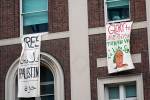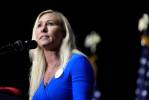Gibbons demands bigger cuts
CARSON CITY -- Gov. Jim Gibbons called Tuesday for even steeper state budget cuts, drawing resistance from a legislative leader and the university system's chancellor.
Gibbons asked most state agencies to prepare for 8 percent budget cuts, rather than the 5 percent sought by his administration in October. State Budget Director Andrew Clinger said the steeper cuts are necessary because Nevada's revenue shortfall is expected to be at least $285 million, about $100 million more than previous estimates.
The shortfall could increase next week, when state government receives reports on revenue from sales taxes, real property, insurance, business payroll and other taxes.
On Oct. 15, when Gibbons first asked agencies to prepare a list of ways they could cut their budgets, the governor had estimated the shortfall would be $184 million.
Assembly Speaker Barbara Buckley, D-Las Vegas, called on Gibbons to look at other options beyond across-the-board 8 percent cuts.
"What we need is a Nevada-style solution rather than the cookie-cutter reductions the governor is calling for," she said. "We need a balanced approach that takes into consideration the potential impact on human lives and the economy as a whole."
Buckley said Gibbons could cover the shortfall by taking funds from the state's $267 million rainy day fund, delaying a scheduled payment of $36 million to that fund and postponing several state construction projects.
She made similar suggestions on Nov. 7, when Gibbons held a summit on the revenue shortfall with legislators and local government officials.
Clinger has attributed the revenue decline to a 50 percent drop in home sales in Southern Nevada and a decline in purchases of furniture, other household furnishings and motor vehicles.
Continuing his defiance of the governor, university system Chancellor Jim Rogers said that the Higher Education System of Nevada cannot bear an 8 percent cut and that he would not present a plan for one. Such a cut would total $104 million.
"At some point, somebody's going to have to come up with some solutions instead of giving us a death warrant," Rogers said.
Rogers refused to prepare a cut list in October after Gibbons requested details on how he would reduce college spending by $64 million, 5 percent.
If Rogers continues to balk at the governor's requests, Gibbons could reduce general fund appropriations to higher education and force the chancellor to make reductions.
Rogers also called for Gibbons to dip into the state's rainy day fund to make up for the shortfall. And Rogers suggested the governor increase taxes to cover the shortfall.
Gibbons has vowed not to increase taxes.
"He's got to make the decision as to whether he really wants to be an education governor or whether he doesn't," Rogers said. "And if he wants to be, he's going to have to change the rules."
But Assembly Minority Leader Heidi Gansert, R-Reno, said it is prudent for Gibbons to make cuts now and avoid using rainy day funds until absolutely necessary.
"We are so early in the budget cycle," she said. "We don't know how long this is going to last, or how much money we will need."
The state is operating under a two-year, $6.8 billion budget that ends on June 30, 2009.
Gansert said that the current budget is $1 billion larger than the previous two-year budget. Even with the cuts, state spending during the current budget cycle would be $700 million more than the previous budget.
"There is room to cut," she said. "We need to maintain our rainy day funds."
Clinger said the administration is considering delaying construction projects as Buckley has suggested.
"What she is saying is partly what we are doing," Clinger said.
Administration officials do not want to tap into the rainy day fund at this time, he said but they could ask the Legislature to approve the use of such money to make up revenue shortfalls when the Legislature next goes into session in February 2009.
Gov. Kenny Guinn used a similar approach in 2003, when he won approval to spend all but $1 million in a $136 million rainy day fund.
Clinger repeated that public school education, the prison system and public safety agencies, such as the Nevada Highway Patrol, are exempt from the cuts.
He said Gibbons has exempted children's services and juvenile justice services from any budget cuts.
State agencies have been asked to prepare new lists showing how they would cut spending by 8 percent, Clinger said, but not all programs would face cuts that deep.
Members of Gibbons' staff will review the lists and decide where reductions should be made. Gibbons has said he would not announce any cuts before January.
Eight percent cuts to state programs that are already underfunded could have serious consequences for all Nevadans, Buckley said.
"For example, the mentally ill population in our state is not going to magically go down," Buckley said. "If funding is cut to treatment programs, there will be even more mentally ill individuals in our already overcrowded emergency rooms and on our streets."























